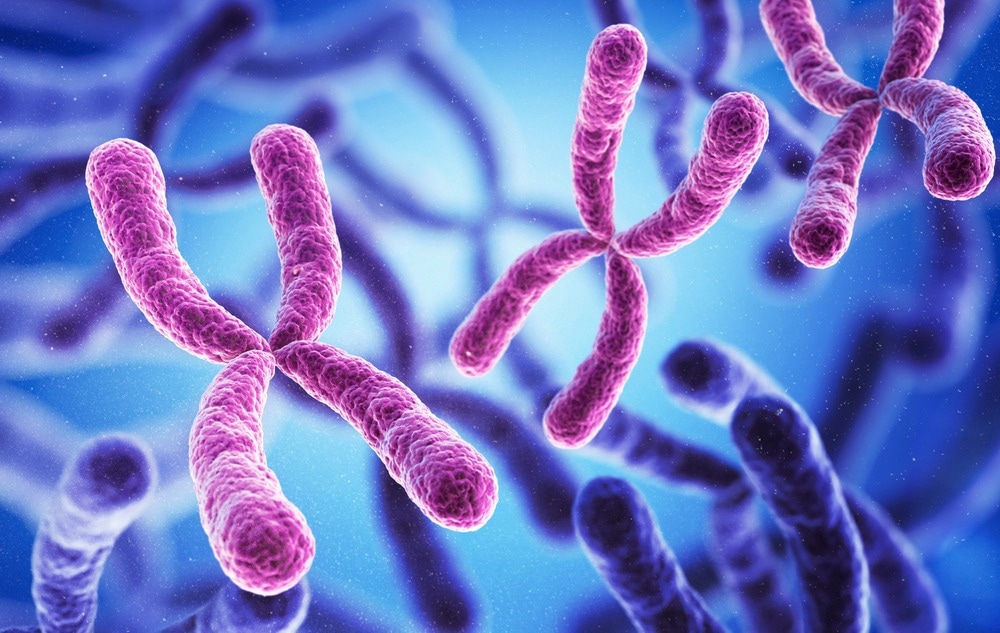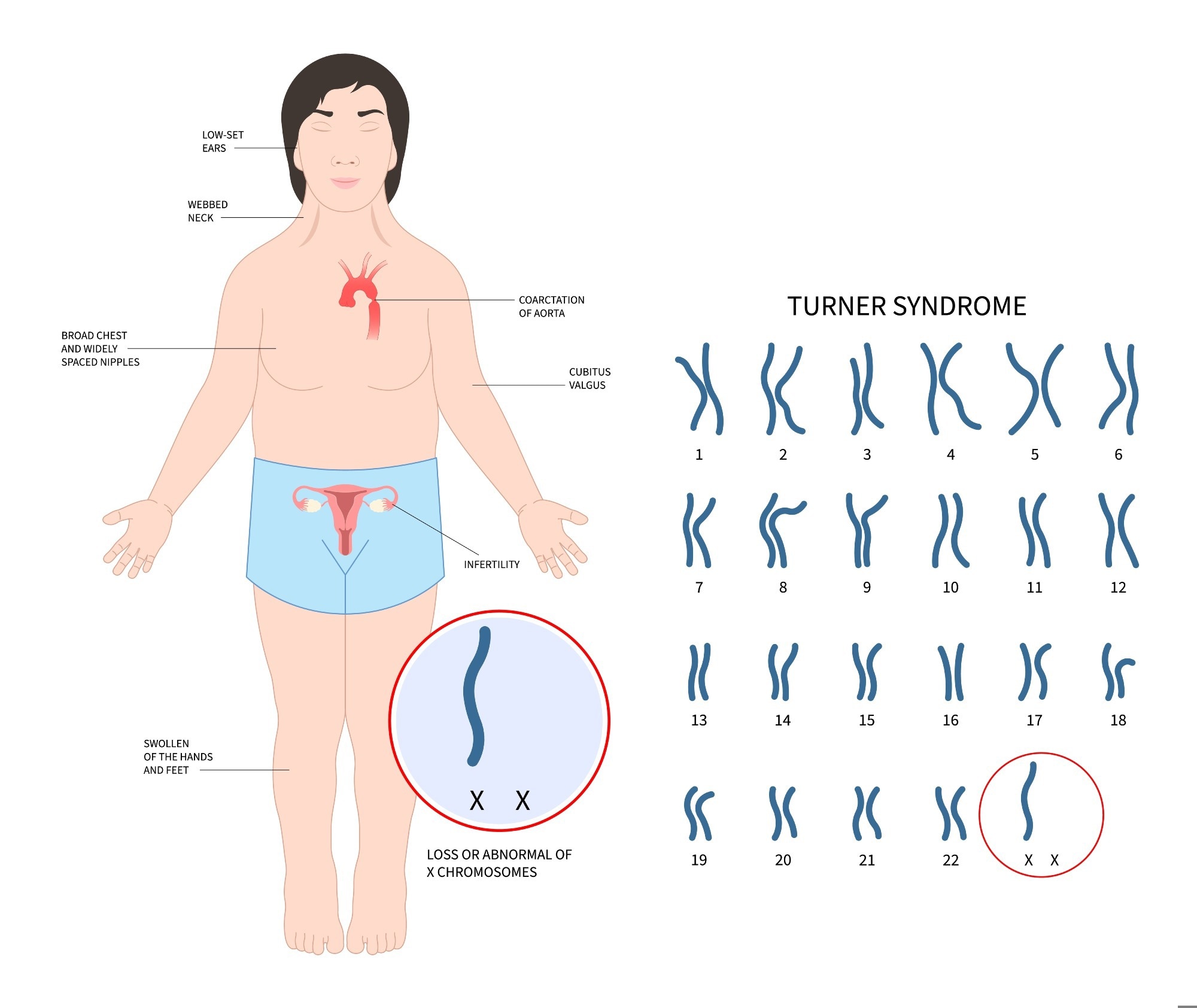Numerical disorders of the X chromosome
X-Linked disorders
Diagnosis of X chromosome disorders
Management and support for X chromosome disorders
References
Further reading
Numerical disorders of the X chromosome
Chromosomal abnormalities can include two basic categories: numerical or structural. A structural abnormality can include an alteration to the structure of the chromosome, as the name suggests. However, a numerical abnormality means that an individual is either missing one of the chromosomes from its pair or that the individual has more than two chromosomes.1
The number of chromosomes in the human cell includes 46, with 23 pairs, one set being inherited from the egg provided by the biological mother and the other set of 23 chromosomes being inherited from the sperm provided by the biological father.1
The first 22 pairs are known as autosomes, whereas the final pair are called “sex chromosomes,” which determine an individual’s sex, with a female having two X chromosomes (XX) and a male having both an X and Y chromosome (XY).1,2
Numerical abnormalities are more common than structural abnormalities, with these mutations in sex chromosomes having different implications compared to autosomes.2

Image Credit: Anusorn Nakdee/Shutterstock.com
Having an abnormal number of chromosomes in a cell instead of 46 is known as aneuploidy. Sex chromosome aneuploidies can lead to diseases such as (i) Klinefelter’s syndrome, (ii) Triple X syndrome (Trisomy X), and (iii) Turner syndrome.2
Klinefelter’s syndrome
Klinefelter’s syndrome consists of an abnormally higher number of chromosomes than the usual 46 total chromosome number, consisting of 47 chromosomes in more than 90% of cases, which have XXY chromosomes. However, other karyotypes can include, but are not limited to, 48 chromosomes (XXXY) and 49 chromosomes (XXXXY).2
This disease affects males, with the incidence being reported as being between 1 in 500 cases and impacting 1:1,000 male births. Klinefelter’s syndrome can result in being taller than average, having long extremities, delayed and incomplete puberty, small testes and testicular atrophy, infertility, enlarged breast tissue, and an increased risk of breast cancer.2
Additionally, these males also display less facial and bodily hair and developmental delay, including having learning disabilities as well as having delayed speech and language development.2
The prognosis of these males is also variable depending on the severity of the clinical manifestations and treatment; however, it is still fairly good, with a slightly reduced lifespan.2
Triple X syndrome (Trisomy X)
Another chromosomal alteration impacting sex chromosomes includes Triple X syndrome or Trisomy X, which impacts 1 in 1,000 females from birth due to having 47 chromosomes in total, with an extra X chromosome (XXX).2
Females with this chromosomal abnormality grow to be taller than the average height, as well as other potential effects such as delayed development of speech, language, and motor skills, weak muscle tone, seizures, behavioral and emotional challenges, and kidney abnormalities. However, some cases of this syndrome may appear to be phenotypically normal.2
Like Klinefelter’s syndrome, the prognosis of Triple X syndrome is also variable, depending on its severity and treatment, but it is fairly good overall.2
Turner syndrome
Turner syndrome is known to be the most common sex chromosomal abnormality in females, as well as the most common genetic cause of primary amenorrhea, which includes the absence of menstruation in girls by the age of 15.2
 Illustration of Turner Syndrome, a genetic condition characterized by the loss or abnormality of one X chromosome, leading to specific physical traits and health challenges. Image Credit: Pepermpron/Shutterstock.com
Illustration of Turner Syndrome, a genetic condition characterized by the loss or abnormality of one X chromosome, leading to specific physical traits and health challenges. Image Credit: Pepermpron/Shutterstock.com
This abnormality results in 45 chromosomes in total in 45% of cases due to the majority of zygotes being unable to survive the external world after being born. However, other cases can also include different total chromosomal numbers, including 46 and 47 chromosomes.2
The incidence of this disorder includes approximately 1 in 2,000 to 1 in 2,500 live females at birth, with significant effects such as reduced height and short stature. Additionally, this disorder can cause females to have low posterior hairline, absence of menstruation, infertility, skeletal abnormalities, congenital kidney or heart disease, and lymphedema.2
Turner syndrome also consists of an overall good prognosis; however, this is variable depending on the severity of clinical manifestations and treatment.2
X-Linked disorders
Hemophilia B
X-linked inheritance is determined by a gene on the X chromosome, with X-linked recessive disorders typically manifesting only in males, while X-linked dominant disorders affect both sexes.3
Hemophilia B is an example of an X-linked disorder. It is a rare hematological disorder that causes spontaneous or prolonged hemorrhages as a result of a deficiency in the clotting IX factor. This disorder impacts less than 5,000 people in the U.S. and can manifest from birth to childhood.4
Hypophosphatemic rickets
Another X-linked disorder example includes hypophosphatemia (XLH), which most commonly causes hypophosphatemic rickets and impacts 1 in 20,000 people.5
What is X-linked Recessive Inheritance?
Hypophosphatemia occurs when there are genetic defects in the sodium-phosphate cotransporters in the kidneys or their regulators, which can impair the reabsorption of filtered phosphate. Persisting impairment of this function in children can lead to rickets, which can cause dysfunction in mineralizing growing bones due to phosphate being required with calcium to form hydroxyapatite for the mineralization of bones.5
The most common cause of rickets is usually nutritional vitamin D deficiency or reduced calcium intake. However, hypophosphatemic rickets is a genetic disorder.5
Mohr-Tranebjaerg syndrome
Mohr-Tranebjaerg Syndrome (MTS) is a rare X-linked neurodegenerative disorder that causes early-onset hearing loss, gradual and progressive dystonia (uncontrolled muscle spasms), and optic atrophy. This disorder is caused by mutations in the nuclear TIMM8A gene, which plays a role in the mitochondrial transport of metabolites. Its association with multiple systems has also led to frequent occurrences of psychiatric disorders in these patients, such as dementia and mental retardation.6
Interestingly, less than 100 cases of MTS have been reported since its first description in a family in 1960.6
Opitz-Kaveggia syndrome
Opitz-Kaveggia Syndrome or FG Syndrome 1 (FGS1) comprises characteristics such as developmental delay, facial abnormalities including a large head and down slanting eyes, and poor muscle tone from birth. FGS1 can also impact other bodily systems, such as genitourinary, gastrointestinal, and musculoskeletal systems.7
The prevalence of this disorder is unknown; however, it is caused by a mutation in the MED12 gene, which leads to the complete or partial absence of the corpus callosum that connects the two hemispheres of the brain.7
Diagnosis of X chromosome disorders
Two main methods can be used to diagnose these X chromosome disorders: (i) karyotyping and (ii) fluorescent in-situ hybridization (FISH).2
Karyotyping
Karyotyping is considered to be the most definitive method for identifying chromosomal abnormalities, with this process requiring cells to be inoculated and cultured for 10 to 11 days, with diagnosis rates including 97.8% for chorionic villus sampling and 99.4% for amniocentesis. This method is considered to be the “gold standard” for diagnosing fetal aneuploidies in amniotic fluid samples.2
However, there are disadvantages to this method, such as requiring cells to be in the metaphase stage of the cell cycle, which does not always occur with sufficient quality for accurate quantification of chromosomes. Additionally, the time scale of karyotyping is 1-2 weeks.2
Fluorescent in-situ hybridization
The second type of testing method includes FISH, which uses fluorescent-labeled DNA probes to assess the complementary DNA sequence of interest in the genome by hybridization, investigating its presence, location, and copy number. This method is relatively fast when identifying structural chromosomal abnormalities with small regions of DNA.2
FISH technology has also advanced other techniques, leading to powerful analytical tools such as spectral karyotyping, multicolor FISH, and comparative genomic hybridization.2
Early detection of chromosomal disorders is significant as approximately 0.4% to 0.9% of newborns are born with chromosomal abnormalities, with an estimated half having an abnormal phenotype.2
Knowledge of these chromosomal abnormalities is essential for informed choice and prevention strategies, as well as effective management of symptoms, including genetic counseling.2
Management and support for X chromosome disorders
There are various management strategies available for X chromosome disorders, including hormone therapy, with support also being available for how to manage any side effects.8
Additionally, a survey of adolescents and young adults with Klinefelter’s syndrome found approximately one-third of the sample experienced psychological challenges, including depression, anxiety, low self-esteem, and mood instability.8
Genetic counseling and specialized medical care can be useful to support families and patients who are struggling with their diagnosis, including seeing behavioral specialists and psychiatrists.8
Specialty referral to reproductive gynecological care specialists can also be helpful for those concerned about fertility when patients are of age. However, for some infertile patients, discussing infertility at an age-appropriate time is also significant and may require extra support from healthcare professionals.8
References
- Chromosome Abnormalities Fact Sheet. Genome.gov. https://www.genome.gov/about-genomics/fact-sheets/Chromosome-Abnormalities-Fact-Sheet. Accessed January 1, 2025.
- Milani D.AQ, Tadi P. Genetics, chromosome abnormalities. StatPearls [Internet]. https://www.ncbi.nlm.nih.gov/books/NBK557691/. Published April 24, 2023. Accessed January 1, 2025.
- Basta M, Pandya AM. Genetics, X-linked inheritance. StatPearls [Internet]. https://www.ncbi.nlm.nih.gov/books/NBK557383/. Published May 1, 2023. Accessed January 1, 2025.
- Hemophilia B. Genetic and Rare Diseases Information Center. https://rarediseases.info.nih.gov/diseases/8732/hemophilia-b. Accessed January 1, 2025.
- Park E, Kang HG. X-linked hypophosphatemic rickets: From diagnosis to management. Clinical and Experimental Pediatrics. 2024;67(1):17-25. doi:10.3345/cep.2022.01459.
- Wang H, Wang L, Yang J, et al. Phenotype prediction of Mohr-TRANEBJAERG syndrome (MTS) by genetic analysis and initial auditory neuropathy. BMC Medical Genetics. 2019;20(1). doi:10.1186/s12881-018-0741-3.
- FG Syndrome Type 1 - Symptoms, Causes, Treatment: Nord. National Organization for Rare Disorders. https://rarediseases.org/rare-diseases/fg-syndrome-type-1/#symptoms. Published November 20, 2023. Accessed January 1, 2025.
- Riggan KA, Ormond KE, Allyse MA, Close S. Evidence-based recommendations for delivering the diagnosis of X & Y Chromosome Multisomies in children, adolescents, and young adults: An integrative review. BMC Pediatrics. 2024;24(1). doi:10.1186/s12887-024-04723-0.
Further Reading
Last Updated: Jan 6, 2025